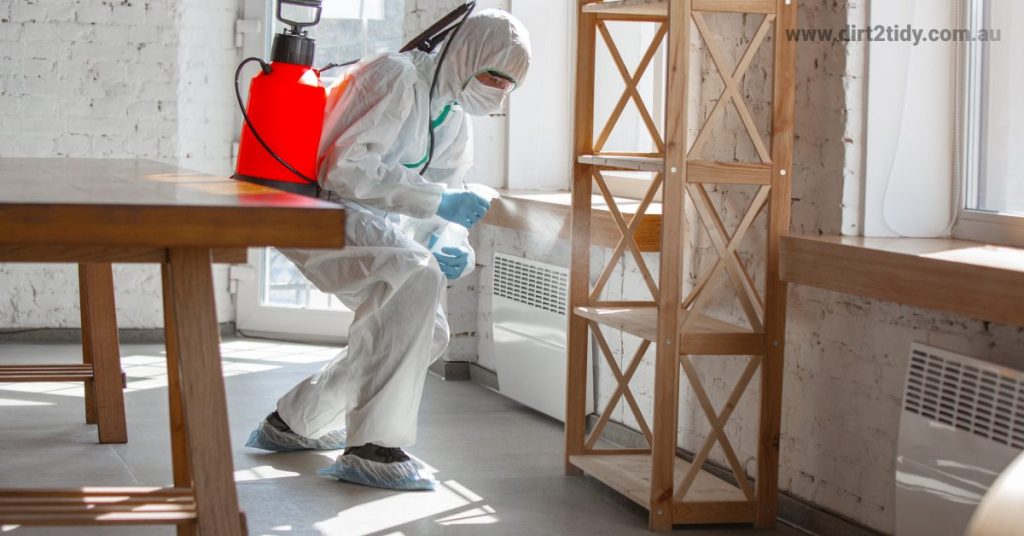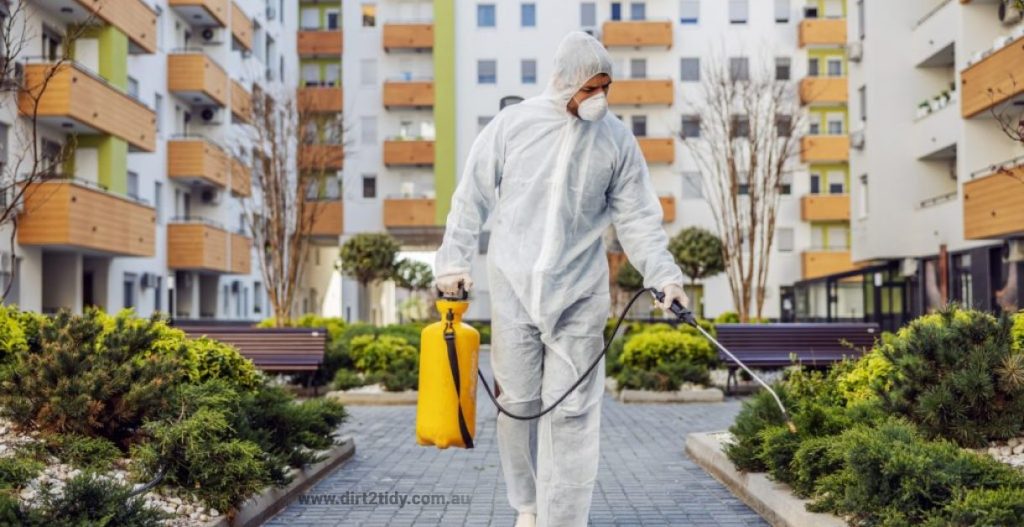Table of Contents
If you live in an apartment complex, your landlord probably handles pest control and vermin control for communal areas. You maintain private spaces.
With the correct equipment and knowledge, you can control pests. Apartment pest prevention is straightforward.
What are the most common pests found in Queensland apartment and townhouse complexes?
Queensland subtropical climate means you’ll frequently encounter a roster of unwelcome guests in apartment and townhouse blocks. Cockroaches seem to have lifetime leases, popping up in kitchens and bathrooms. Ants are always on the hunt for crumbs, and rodents—especially rats and mice—are notorious for finding their way inside looking for warmth or a snack.
You might also spot wasps around eaves and entryways during warmer months. Other potential intruders include spiders (sometimes the size of a fifty-cent coin), the occasional snake slithering in from nearby gardens, termites targeting timber, and possums treating your roof cavity like a penthouse suite.
Being aware of these common culprits is the first step to keeping your home comfortable and pest-free.
Apartment pest control service sprays where?
Dirt2Tidy understands renters’ concerns regarding harmful chemicals used to deal with pests. Though we’re Green Shield Certified and employ non-toxic, eco-friendly solutions, care is always wise. Technicians will spray:
- BaseboardssEntryways
- Fissures
- Wall-to-cabinet, appliance, or furniture-to-wall gaps
Why do we spray apartments?
Two objectives. First, they’ll remove existing pests. Second, they want to exclude us well. Keeping out all types of pests. Your tech may also put out bait packages or inspect external regions. But here’s something a lot of renters overlook: apartment pests rarely respect unit boundaries. If you notice any unwelcome guests, it’s wise to let your next-door neighbours know as well. Why? Because a pest problem in one unit can quickly become a pest party for the whole block. Coordinating with neighbours (and building management) means treatments can be done together, making it much harder for pests to play hopscotch from one apartment to the next. It’s the only way to avoid the world’s most frustrating game of “No Backsies.”
Who’s Responsible for Rental Pest Control?
In most states and municipalities, landlords are responsible for pest management. An infestation of pests like cockroaches, ants, bedbugs, termites or rats can render an area uninhabitable.
You may also like to read: Can I break my lease because of cockroaches and mice?
A landlord may be exempt from apartment pest control if a tenant’s lifestyle or personal decisions caused the problem. This affects tenants. Renters could take a few basic actions to avoid pests. This includes some pest control tips like:
- After-use dishwashing and storage
- Cleaning after meals
- Sweeping and mopping
- Eliminating pest-hiding clutter
- Report leaking faucets, sweating pipes, or window or door seals.
What if pests are found in multiple units?
Pest issues have a habit of spreading from one apartment to the next—pests don’t respect property lines or politely knock before entering. If you discover an infestation and suspect it isn’t limited to just your home, it’s a smart move to alert your neighbors as well. This helps everyone in the building tackle the problem together, rather than playing an endless game of “whack-a-mole.”
Coordinated action is key. Once several units are affected, let your property manager or landlord know right away so they can arrange an inspection for all impacted apartments. Many reputable pest control companies—like can assess adjacent units at the same time and develop a building-wide plan. This not only increases the chances of stopping the pests in their tracks but also prevents frustrating re-infestations down the line.
The bottom line? Early communication and group effort beat going it alone. By teaming up with neighbors and your landlord, pest control professionals can target the root of the problem and keep everyone’s home comfortable and bug-free.

Apartment Pest Control
The EPA’s explanation of integrated pest management (IPM), which Dirt2Tidy has done for years, gives crucial insights on how renters and landlords may keep insects and rodents out of housing units.
IPM systems manage crops, lawns, and interior spaces to prevent insect problems. This implies you should manage the apartment’s outside to prevent pests from entering and the interior to discourage them from staying.
The landlord must ensure any cracks and crevices are sealed. Keeping doors weatherstripped and mesh over dryer vents and attic access points helps. How to bug proof your flat means implementing best practices like:
- eliminating trash quickly
- Daily surface cleaning
- Airtight food storage
- Regular vacuuming
- Tenants should be careful when returning from travels or bringing in secondhand furniture, as both might carry insects.
Is Body Corporate Pest Control More Cost-Effective?
Absolutely—coordinated pest control through the body corporate can be a smart move, especially in larger apartment complexes. Instead of each owner or tenant shouldering individual service fees, a collective approach usually means a group booking discount. Think of it like buying in bulk at rather than paying full price for a single item at the corner store.
Here’s how shared pest control can save money:
- Bundled Services: Treating all apartments (or multiple lots) at once usually qualifies for lower per-unit rates.
- Streamlined Scheduling: Organizing a single visit covers multiple dwellings and shared spaces, saving time and transport costs.
- Uniform Protection: When every lot gets treated simultaneously, it reduces the risk of re-infestation from a neighbour who skipped their own service.
The body corporate might also arrange additional optional services—like carpet cleaning or window washing—on top of the building’s regular maintenance. These services are often offered to residents at a discounted group rate, benefitting everyone’s bottom line.
Tenant pest control when?
According to NSW Fair Trading, a renter is liable for eradicating pests if the infestation is caused by the tenant’s actions or lack of cleanliness as per tenancy agreement.
If a rental property has been rented for several months before cockroaches appear, the renter usually pays for pest control professional treatments.
If a tenant feels the infestation was not caused by their actions or lack of cleanliness, the renter must establish that:
The landlord breached the rental agreement by not providing a clean and safe premises at the outset of the tenancy; and this violation created the pest problem.
It’s important to remember that both tenants and landlords share responsibility for maintaining the property’s safety, cleanliness, and functionality. Most tenancy agreements will specify who is responsible for pest issues, so it’s wise to check your lease for clarity. If you’re unsure or need further clarification, speaking with the property manager can help resolve any uncertainty about roles and responsibilities.

When does the landlord control pests?
The landlord must remove pests if they are present at the commencement of the rental. The landlord must provide a clean, habitable property as per lease agreement. When a tenancy begins, the landlord is responsible for pest control.
It’s crucial for renters to document any pests in the condition report at the start of the rental. On the condition report, record cockroach droppings, fleas, Termites etc., and address them with your property management.
End of Tenancy Pest Control Responsibilities
If you have pets, you’ll typically be required to arrange a flea treatment or pest spray when your lease ends—even if you haven’t noticed any issues. This tends to be a standard clause in many lease agreements, so it’s smart to double-check your contract beforehand.
For other pest issues that arise during your tenancy, like ants, cockroaches, spiders, or even wasps setting up shop after you’ve moved in, you’re generally responsible for their removal. The same goes if you discover an unwelcome guest like a snake; dealing with such surprises usually falls on the tenant.
Essentially, the law expects both landlord and tenant to keep things clean, functional, and safe. If you’re ever unsure about your responsibilities, review your tenancy agreement or touch base with your property manager. Clear communication saves a lot of headaches (and possibly prevents unexpected bug encounters later on).
You may also like to read: Are tenants or landlords responsible for pest control?
If there are bed bugs at the start of the tenancy, the tenant might ask the landlord to hire a pest control agency. If the landlord doesn’t agree to or perform an agreed pest control treatment, the tenant may allege the landlord is in violation of contract and appeal to NSW Fair Trading for dispute resolution.
Here are the 4 best ways to avoid bugs
Keep tidy
Regular cleaning and upkeep are key to apartment pest management. Trash attracts ants, cockroaches, rats, and flies. Trash is a breeding ground for bugs. Urgently clean up spills. Termite infestation can be reduced by covering structural timber.
Reduce humidity
Moisture attracts insects and rodents. They also promote the formation of dangerous mould and mildew. Keeping apartment moisture levels low minimises undesired buildup.
Illuminate every corner
Pests prefer darkness. This refers to unreachable parts of your dwelling. Use enough light in each room to cover all regions and repel bugs.

Consult an exterminator
These individuals know what to do. They work quickly and well. These pros know the right apartment pest treatment for each problem.
Professional Help
Pest control may be a never-ending, intimidating chore. Pest control requires a skilled professional’s competence. Dirt2Tidy Pest Exterminators can rapidly and successfully remove apartment pests. They can also locate the infestation’s origins and prevent future ones.
Dirt2Tidy Pest Exterminators uses safe, eco-friendly procedures that won’t harm your family or pets. Pest control may be expensive, risky, and time-consuming. Dirt2Tidy specialises in apartment pest management. Here are three advantages to employ our services instead of doing it yourself:
- They have the skills and competence to remove challenging pests.
- They offer the newest technology and equipment to swiftly eradicate bugs from your residence.
- They offer a complete service that eliminates and prevents pests.
Pest control may be frustrating and futile. Dirt2Tidy Pest Exterminators may save you time and bother.





